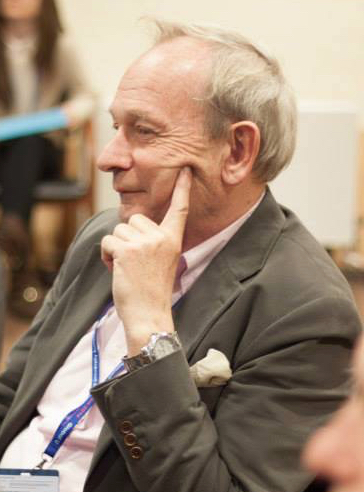The first part of Alastair Crooke's historical analysis of the roots of ISIS and its impact on the future of the Middle East:
You Can't Understand ISIS If You Don't Know the History of Wahhabism in Saudi Arabia
BEIRUT -- The dramatic arrival of Da'ish (ISIS) on the stage of Iraq has shocked many in the West. Many have been perplexed -- and horrified -- by its violence and its evident magnetism for Sunni youth. But more than this, they find Saudi Arabia's ambivalence in the face of this manifestation both troubling and inexplicable, wondering, "Don't the Saudis understand that ISIS threatens them, too?"
It appears -- even now -- that Saudi Arabia's ruling elite is divided. Some applaud that ISIS is fighting Iranian Shiite "fire" with Sunni "fire"; that a new Sunni state is taking shape at the very heart of what they regard as a historical Sunni patrimony; and they are drawn by Da'ish's strict Salafist ideology.
Other Saudis are more fearful, and recall the history of the revolt against Abd-al Aziz by the Wahhabist Ikhwan (Disclaimer: this Ikhwan has nothing to do with the Muslim Brotherhood Ikhwan -- please note, all further references hereafter are to the Wahhabist Ikhwan, and not to the Muslim Brotherhood Ikhwan), but which nearly imploded Wahhabism and the al-Saud in the late 1920s.
Many Saudis are deeply disturbed by the radical doctrines of Da'ish (ISIS) -- and are beginning to question some aspects of Saudi Arabia's direction and discourse.
THE SAUDI DUALITY
Saudi Arabia's internal discord and tensions over ISIS can only be understood by grasping the inherent (and persisting) duality that lies at the core of the Kingdom's doctrinal makeup and its historical origins.
One dominant strand to the Saudi identity pertains directly to Muhammad ibn ʿAbd al-Wahhab (the founder of Wahhabism), and the use to which his radical, exclusionist puritanism was put by Ibn Saud. (The latter was then no more than a minor leader -- amongst many -- of continually sparring and raiding Bedouin tribes in the baking and desperately poor deserts of the Nejd.)
The second strand to this perplexing duality, relates precisely to King Abd-al Aziz's subsequent shift towards statehood in the 1920s: his curbing of Ikhwani violence (in order to have diplomatic standing as a nation-state with Britain and America); his institutionalization of the original Wahhabist impulse -- and the subsequent seizing of the opportunely surging petrodollar spigot in the 1970s, to channel the volatile Ikhwani current away from home towards export -- by diffusing a cultural revolution, rather than violent revolution throughout the Muslim world.
But this "cultural revolution" was no docile reformism. It was a revolution based on Abd al-Wahhab's Jacobin-like hatred for the putrescence and deviationism that he perceived all about him -- hence his call to purge Islam of all its heresies and idolatries.
To read the whole article : http://www.huffingtonpost.com/alastair-crooke/isis-wahhabism-saudi-arabia_b_5717157.html
And the second part of the historical analysis of the roots of ISIS and its impact on the future of the Middle East:
Middle East Time Bomb: The Real Aim of ISIS Is to Replace the Saud Family as the New Emirs of Arabia
BEIRUT -- ISIS is indeed a veritable time bomb inserted into the heart of the Middle East. But its destructive power is not as commonly understood. It is not with the "March of the Beheaders"; it is not with the killings; the seizure of towns and villages; the harshest of "justice" -- terrible though they are -- that its true explosive power lies. It is yet more potent than its exponential pull on young Muslims, its huge arsenal of weapons and its hundreds of millions of dollars.
"We should understand that there is really almost nothing that the West can now do about it but sit and watch."
Its real potential for destruction lies elsewhere -- in the implosion of Saudi Arabia as a foundation stone of the modern Middle East. We should understand that there is really almost nothing that the West can now do about it but sit and watch.
The clue to its truly explosive potential, as Saudi scholar Fouad Ibrahim has pointed out (but which has passed, almost wholly overlooked, or its significance has gone unnoticed), is ISIS' deliberate and intentional use in its doctrine -- of the language of Abd-al Wahhab, the 18th century founder, together with Ibn Saud, of Wahhabism and the Saudi project:
Abu Omar al-Baghdadi, the first "prince of the faithful" in the Islamic State of Iraq, in 2006 formulated, for instance, the principles of his prospective state ... Among its goals is disseminating monotheism "which is the purpose [for which humans were created] and [for which purpose they must be called] to Islam..." This language replicates exactly Abd-al Wahhab's formulation. And, not surprisingly, the latter's writings and Wahhabi commentaries on his works are widely distributed in the areas under ISIS' control and are made the subject of study sessions. Baghdadi subsequently was to note approvingly, "a generation of young men [have been] trained based on the forgotten doctrine of loyalty and disavowal."
And what is this "forgotten" tradition of "loyalty and disavowal?" It is Abd al-Wahhab's doctrine that belief in a sole (for him an anthropomorphic) God -- who was alone worthy of worship -- was in itself insufficient to render man or woman a Muslim?
To read the whole article: http://www.huffingtonpost.com/alastair-crooke/isis-aim-saudi-arabia_b_5748744.html
To know more about Alastair Crooke click the photo.
Alastair Crooke is IMESClub friend.













